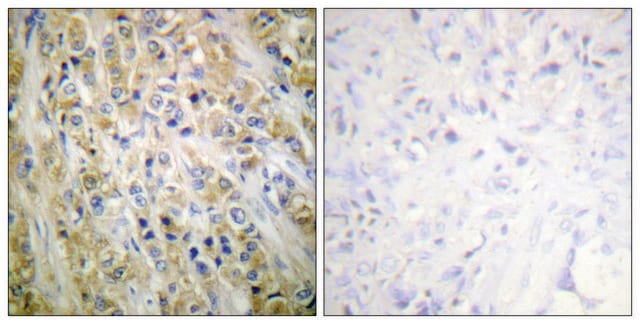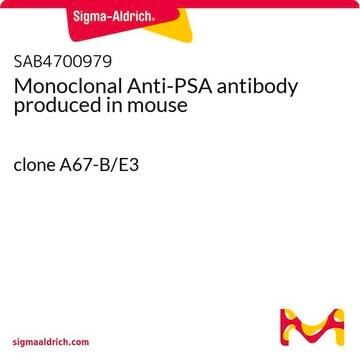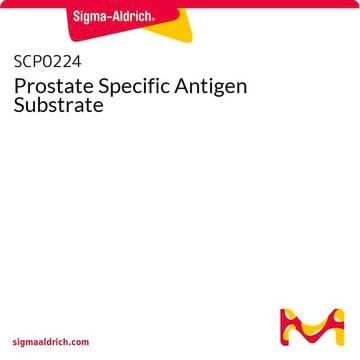P3235
Prostate Specific Antigen from human semen
buffered aqueous solution
Sinónimos:
Cancer-associated PSA, PSA
Iniciar sesiónpara Ver la Fijación de precios por contrato y de la organización
About This Item
Productos recomendados
origen biológico
human semen
Nivel de calidad
Análisis
≥99% (SDS-GE)
formulario
buffered aqueous solution
Nº de acceso UniProt
Condiciones de envío
wet ice
temp. de almacenamiento
−20°C
Información sobre el gen
human ... KLK3(354)
¿Está buscando productos similares? Visita Guía de comparación de productos
Descripción general
Prostate specific antigen (PSA) is a 26kDa single-chain glycoprotein containing 237 amino acids, encoded by the kallikrein gene mapped to human chromosome 19. It is specifically expressed by human prostate tissue and is a highly abundant proteolytic enzyme expressed in the seminal fluid.
Acciones bioquímicas o fisiológicas
Prostate Specific Antigen (PSA), a glycoprotein of the glandular kallikrein family, is a serine protease with chymotrypsin-like enzymatic activity. Circulating PSA exists in free and protease inhibitor-bound forms. Studying the ratios of free to inhibitor-bound forms may prove valuable in the diagnosis of prostate cancer.
Prostate-specific antigen (PSA) is an androgen-regulated serine protease specifically produced by prostatic tissue and is secreted into the lumen. PSA in semen cleaves semenogelins present in the seminal coagulum. Total PSA levels are increased in serum of prostate cancer (PCa) patients. PSA functions as a potential biomarker for PCa. Serum protease inhibitors such as α1-antichymotrypsin (α1-ACT), α2-macroglobulin (α2-M) and other acute-phase proteins form irreversible complexes with circulating PSA and hinder proteolytic activity of PSA.
Forma física
Solution in 10 mM Tris, 0.1% sodium azide, pH 8.0
Código de clase de almacenamiento
11 - Combustible Solids
Clase de riesgo para el agua (WGK)
WGK 3
Punto de inflamabilidad (°F)
Not applicable
Punto de inflamabilidad (°C)
Not applicable
Certificados de análisis (COA)
Busque Certificados de análisis (COA) introduciendo el número de lote del producto. Los números de lote se encuentran en la etiqueta del producto después de las palabras «Lot» o «Batch»
¿Ya tiene este producto?
Encuentre la documentación para los productos que ha comprado recientemente en la Biblioteca de documentos.
Los clientes también vieron
Structure, function, and regulation of the enzyme activity of prostate-specific antigen.
Lilja H
World Journal of Urology, 11(4), 188-191 (1993)
Multiple forms of prostate-specific antigen in serum: differences in immunorecognition by monoclonal and polyclonal assays.
Zhou AM
Clinical Chemistry, 39(12), 2483-2491 (1993)
D A Armbruster
Clinical chemistry, 39(2), 181-195 (1993-02-01)
Prostate-specific antigen (PSA) is a glycoprotein produced exclusively by prostatic tissue. PSA's absolute tissue specificity makes it valuable as a forensic marker and, more important, as a tumor marker for prostatic cancer. Prostatic cancer is prevalent in the older male
Qian Dang et al.
Analytical and bioanalytical chemistry, 408(25), 7067-7075 (2016-03-05)
A simple and sensitive electrogenerated chemiluminescence biosensor was developed to monitor matrix metalloproteinase 2 (MMP-2) by employing a specific peptide (CGPLGVRGK) as a molecular recognition substrate. Bis(2,2'-bipyridine)-4'-methyl-4-carboxybipyridine-ruthenium N-succinimidyl ester-bis(hexafluorophosphate) (Ru(bpy)2(mcbpy-O-Su-ester)(PF6)2 (Ru1) was used as ECL-emitting species and covalently labeled onto
Yi-Kuang Yen et al.
Sensors (Basel, Switzerland), 20(5) (2020-03-07)
A graphene and poly (3,4-ethylenedioxythiophene):poly(styrenesulfonate) (PEDOT:PSS) modified conductive paper-based electrochemical impedance spectroscopy (EIS) aptasensor has been successfully fabricated by a simple and continuous coating process. A graphene/PEDOT:PSS modified paper electrode forms the nanocomposite providing a conductive and sensitive substrate for
Nuestro equipo de científicos tiene experiencia en todas las áreas de investigación: Ciencias de la vida, Ciencia de los materiales, Síntesis química, Cromatografía, Analítica y muchas otras.
Póngase en contacto con el Servicio técnico








